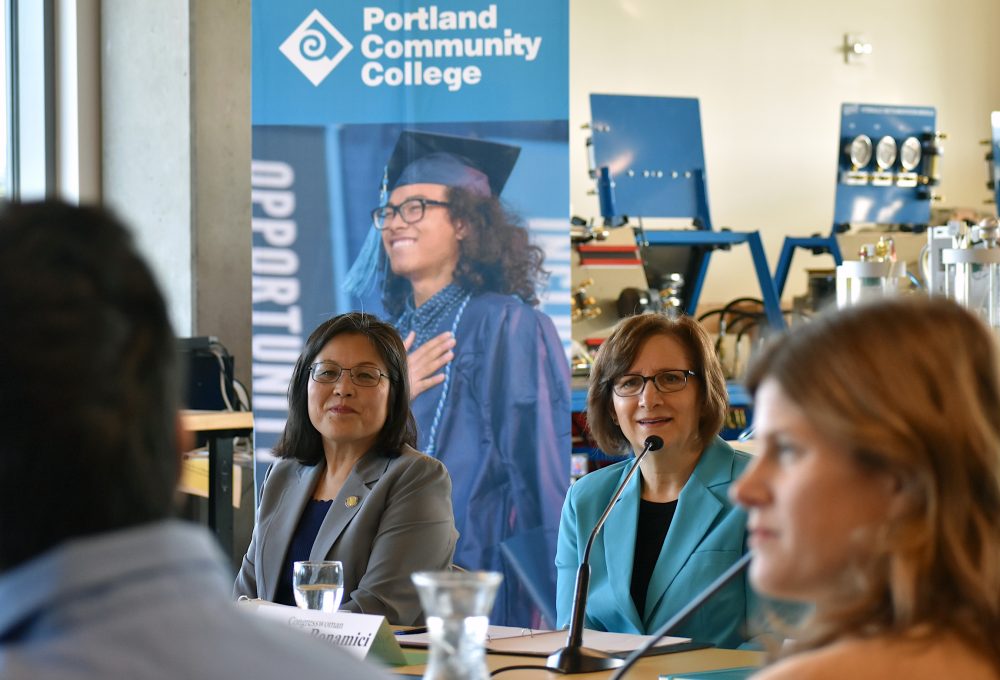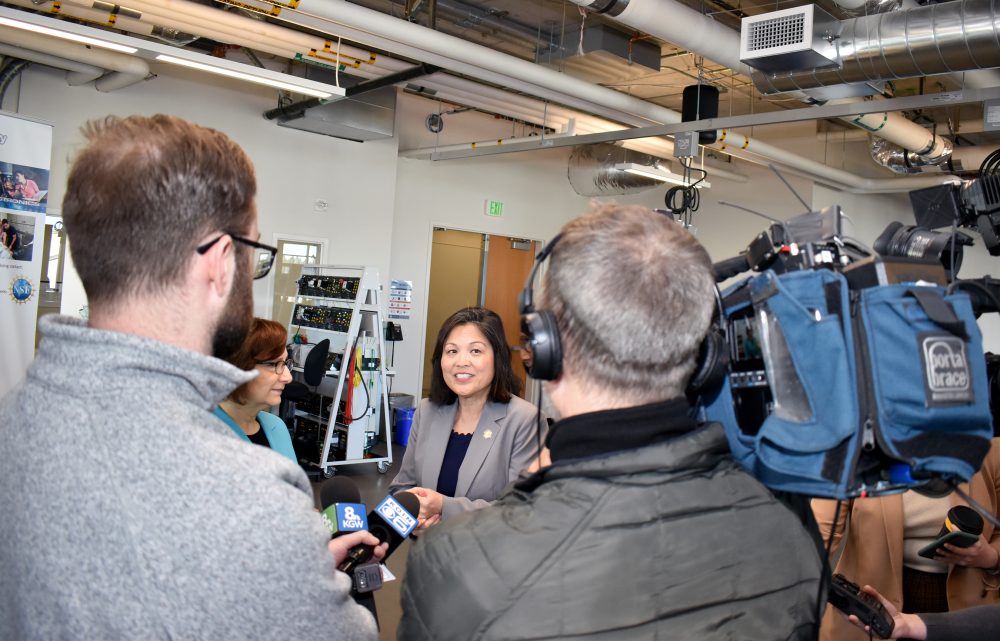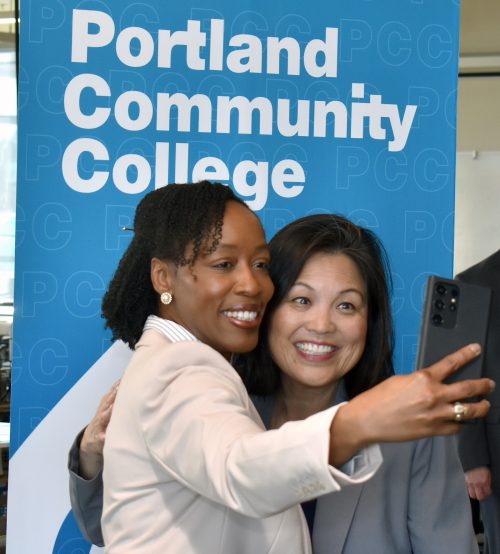This content was published: February 27, 2024. Phone numbers, email addresses, and other information may have changed.
Federal visits showcase PCC’s importance in workforce training, semiconductors
Photos and story by James Hill
For the fourth time in two years, Portland Community College has welcomed a member of U.S. President Joe Biden’s Cabinet to its campuses to learn more about the college’s training programs and initiatives.
On Friday, Feb. 23, acting Secretary of Labor Julie Su joined Oregon Congresswoman Suzanne Bonamici and local leaders for a semiconductor tour and roundtable at the Mechatronics Lab within the Willow Creek Opportunity Center in Washington County – the heart of the Silicon Forest. This follows the Presidential Cabinet visits to Oregon’s largest institution of higher education by the U.S. Department of Health and Human Services Secretary Xavier Becerra, former U.S. Secretary of Labor Martin Walsh, and U.S. Secretary of Commerce Gina Raimondo.
PCC is the epicenter for semiconductor training in the region via a full menu of on-ramp and training programs that provide people the advanced manufacturing skills needed to find living-wage jobs. One of the key areas of focus for PCC is mechatronics, a rapidly evolving interdisciplinary field that encompasses some of the fastest-growing careers globally.
“What you are doing with young people here is needed,” said Secretary Su.
“PCC has been working directly with Intel and industry employers to provide future workers with training and skills that are in demand,” added Bonamici. “There is growing recognition and work from all of the stakeholders that we need to make these training programs and jobs available and accessible to more women, people of color and diversify that workforce.”
The mechatronics lab serves as the focal point for a certificate program focused on hyper-local economic development in the semiconductor field. In partnership with Intel, Worksystems, the City of Hillsboro and Washington County, PCC offers the Quick Start Semiconductor Technician Training Program, a 10-day intensive course designed to equip job-seekers with the necessary skills to secure entry-level technician positions with Intel and other semiconductor manufacturers in the area.
The success of this program is evident with an impressive 63% job placement rate, and a staggering 400-person waitlist. Since it began in late 2022, Quick Start has graduated 275 students with 77% of them women and students of color.
“I want to congratulate and thank the graduates from Quick Start who showed us what they have learned in a relatively short amount of time,” Secretary Su said. “Everyone who wants a job should be able to have one. Seeing what they have learned and how excited they are, is truly wondrous. If we connect young people to the opportunities that they want; that is the only way that we’re going to fully unleash the promising talents of working people across America.”
In addition to preparing students for successful careers, PCC’s advanced manufacturing programs also contribute to the growth and strength of the local semiconductor ecosystem. With an increasing demand for skilled professionals in the semiconductor and advanced manufacturing sectors, PCC plays a pivotal role in bridging the workforce gap and fostering economic mobility in the region.
“I do believe that what you are witnessing is something that could be a model across the nation for community colleges,” said Dr. Adrien Bennings, PCC president. “This is one of the many avenues that students can have to engage in the workforce at an early stage and set themselves up for a successful future.”
To help develop the workforce, the college currently offers students the opportunity to earn dual credits at their high school, complete short-term workforce training, such as a one-year certificate in mechatronics, and a two-year career technical associate degree in microelectronics and electronic engineering technologies. These programs offer students the opportunity to learn the principles of mechatronics and pursue semiconductor careers. Graduates of MT have a nearly 100% hiring rate with reputable companies like Intel, Maxim Integrated, Qorvo, Lam Research, Applied Materials, and Tokyo Electron Ltd.
At PCC’s Sylvania Campus in Southwest Portland, students can enroll in the Machine Manufacturing Technology Program. This program focuses on training students on the computer-aided manufacturing software to control, manipulate, and manage precision computer numerically controlled machinery, further solidifying the college’s reputation as a leading provider of hands-on training in advanced manufacturing.
The college also offers a one-year certificate in mechatronics at the Rock Creek and Willow Creek locations, as well as two mechatronics non-credit training certificates at the Oregon Manufacturing Innovation Center (OMIC) Training Center in Columbia County.
These certificates, the electrical technician and programmable logic controls specialist programs, provide students with hands-on experiences to troubleshoot and solve electrical problems applicable to any manufacturing environment.
It’s all part of PCC’s effort to rejuvenate the area’s semiconductor industry to help the United States become a leader in advanced manufacturing.
“Semiconductors were invented in America, and so there is no reason they can’t be made in America,” explained Secretary Su.




